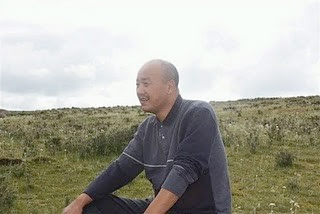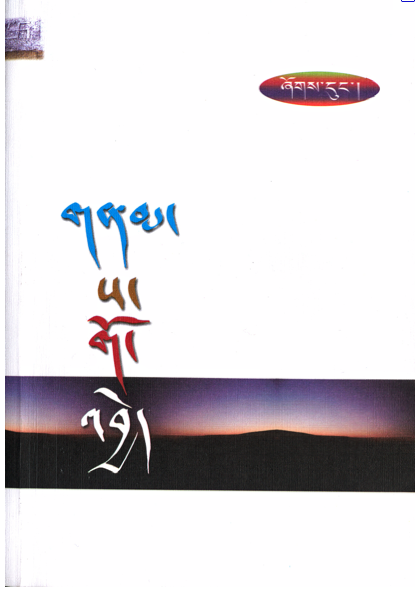
Tragyal [Shogdung] བཀྲ་རྒྱལ། ༼ཞོགས་དུང་།༽
Tragyal (pen name Shogdung) is a Tibetan writer and intellectual, who is believed to be on bail, awaiting trial. He was detained on 23 April 2010 but released on 14 October 2010 and allowed to return home, apparently with his trial still pending. He is the author of the book, “The Line between Sky and Earth” (gnam sa go ‘byed གནམ་ས་གོ་དབྱེད།), published illegally in March 2009. The work has been described by journalist Andrew Jacobs as “a poetic and painstakingly crafted indictment of Chinese rule”, which includes a call for Tibetan bureaucrats and intelligentsia to stop cooperating with Beijing and wage a campaign of civil disobedience. The International Campaign for Tibet reports that Tragyal has been described by sources as achieving the status of a “hero” among Tibetans and his book is selling widely underground. Describing the risks he was taking in publishing “The Line Between Sky and Earth”, Tragyal writes: “I have written of four fears, the fear of contemplating the cruelty of the régime, fear of the danger of government and individuals falling into extreme nationalism, fear for one’s own life and wellbeing, and fear for the future, and at this point, I have one more fear. I am naturally terrified at the thought that once this essay has been made public, I will eventually have to endure the hot hells and cold hells on earth. I may ‘lose my head because of my mouth,’ but this is the path I have chosen, so the responsibility is mine.”
During Tragyal’s detention he was understood to have been held in Xining No. 1 Detention Center. The news of his release was provided by his lawyer, Li Fangping.
༼གནམ་ས་གོ་དབྱེད་༽ཞེས་པའི་དེབ་འདིའི་མཐའ་མཇུག་ཏུ་ཞོགས་དུང་གིས་བྲིས་པར་་་་
མཇུག་བསྡུ་བ།
ཕྱི་ལ་བལྟས་ཏེ་བཤད་ན། དེང་དུས་ཡོངས་ཁྱབ་རིན་ཐང་གི་ཕྱིར་དུ་འཐབ་རྩོད་བྱེད་པ་གང་ཡང་ས་གནས་དེ་ཙམ་མ་ཡིན་པར་འཛམ་གླིང་སྤྱི་ཡི་གནད་དོན་ཞིག་ཏུ་ཆགས་འདུག བོད་ཀྱི་གནད་དོན་ཡང་དེ་བཞིན་འཛམ་གླིང་ཀུན་གྱིས་ཤེས་པའི་གནད་དོན་ཞིག་ཏུ་ཆགས་བཟོ་འདུག བོད་ཀྱི་གནད་དོན་ཞེས་ཀྱང་རུང་། བོད་ཀྱི་དཀའ་ཉོག་ཅེས་ཀྱང་བླ། ལྷ་སའི་དོན་རྐྱེན་ཟེར་ཡང་འདྲ། གང་ལྟར་བོད་དུ་ལྷགས་པའི་གནད་དོན་འདི་ནི། དབང་སྡེམ་སྒེར་གཅོད་པས་བོད་དུ་གནད་དོན་མེད་མདོག་གིས་བོད་རྣམས་ལེགས་པོ་ཆེན་པོའི་དུས་སྐབས་སུ་གནས་ཡོད་ཅེས་དང་། བོད་རྣམས་བརྟན་འཇགས་ལྷིང་ཆགས་སུ་ཡོད་ཅེས་བཤད་པ་ལྟ་བུ་གཏན་ནས་མ་ཡིན་པར། གནད་དོན་ལྷགས་འདུག་པ་གཞིར་བཞག་དང་། གནད་དོན་དེ་ཡང་ཤིན་ཏུ་རབ་ཏུ་ཚབས་ཆེན་གྱི་ངང་ལ་ཡོད་པ་ཕྱི་གསལ་ནང་གསལ་རེད། ཡོངས་གྲགས་བོད་ཀྱི་གནད་དོན་འདི། འཛམ་གླིང་དུ་མི་བསད་ཁྲག་སྦྱོར་གྱི་འཐབ་ར་གསར་པ་ཞིག་ཏུ་མ་ཆགས་སྔོན་ལ། གནད་དོན་ཆེན་པོ་ཞིག་གི་ཚད་ནས་ངོས་འཛིན་བྱེད་མིན་ནི་འཛམ་གླིང་ཆབ་སྲིད་པ་ རྣམས་ཀྱི་བློ་གཤོག་ཆེ་མིན་ལ་རག་ལས་འདུག་ལ། བོད་ཀྱི་གནད་དོན་འདི་ལོ་རྒྱུས་དང་གནས་བབ། དོན་དངོས་ཀྱི་ཆ་སོགས་ནས་གྲོས་མོལ་བྱེད་རྒྱུ་ཡོད་པར་མ་ཟད། བོད་མིའི་མང་མོས་རྨང་གཞིའི་སྟེང་ནས་ཐག་གཅོད་བྱེད་རྒྱུ་ཡོད་པ་བཤད་མ་དགོས། གང་ལྟར་གནད་དོན་ནི་ཐག་གཅོད་མི་བྱེད་རང་བྱེད་ཆགས་འདུག
Concluding paragraph from Shogdung’s book, “The Line between Sky and Earth”:
Nowadays, fighting for universally recognised freedoms is an accepted fact in this world. The Tibet issue seems to be widely recognised in the world as well. What has happened in Tibet – it doesn’t matter what title you give it; the Tibet issue, Tibet’s struggle, or the Lhasa incident – is a situation where the dictators are trying to cover up grievances with propaganda messages describing superbly happy Tibetans and a stable Tibet. But it is far from the truth. The truth is, as everyone knows, is that there is a Tibet issue and it is grave. For Tibet to not become a new scene of bloodshed, the world’s political leaders must stand firm in recognizing the urgency of the Tibet issue. Considering the Tibet issue holistically – its history, situation and practicalities – one sees that this issue can be resolved through dialogue. There is no doubt that there is a consensus amongst Tibetans for a resolution. The Tibet issue must be resolved.



